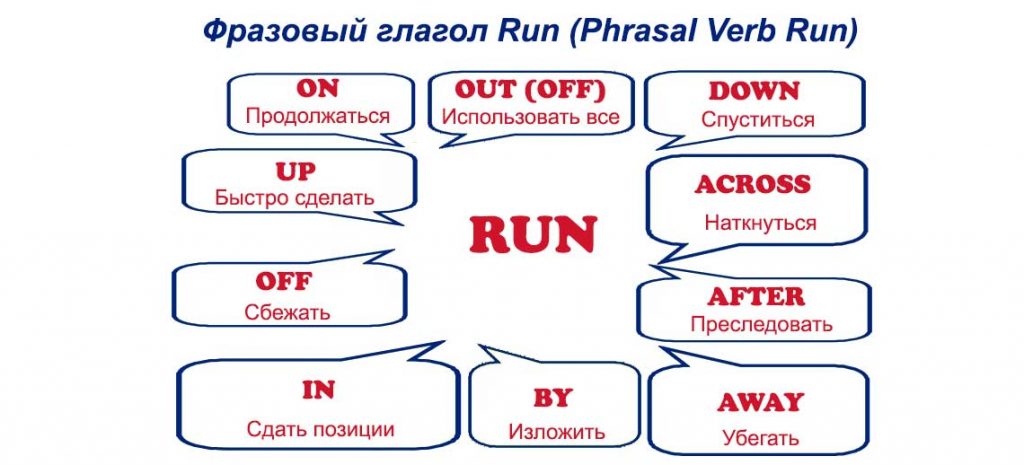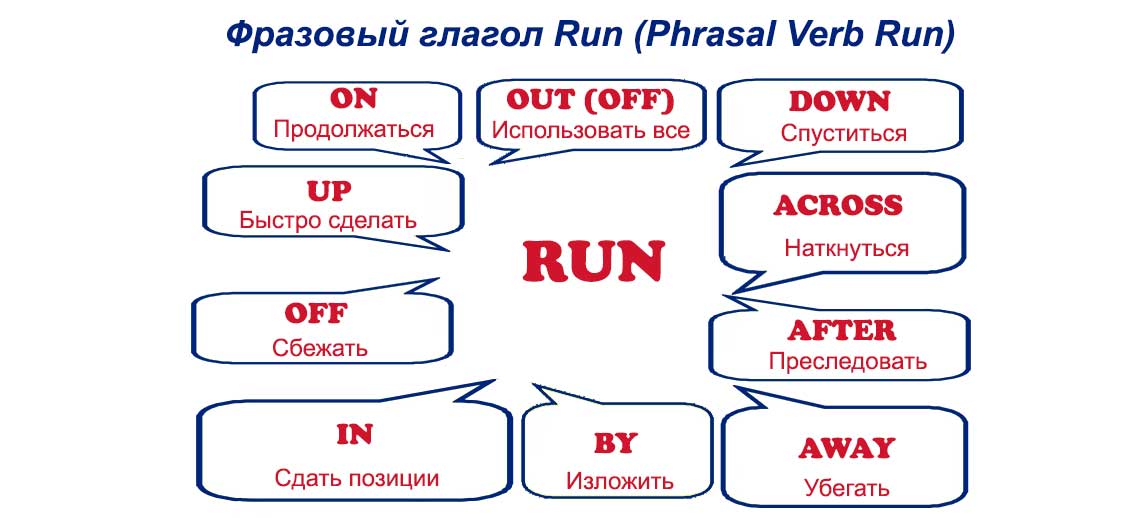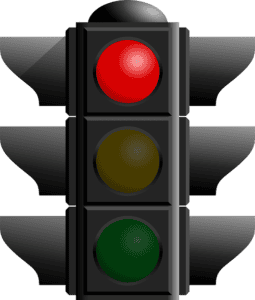Synonym: be given, black market, bleed, break away, bunk, campaign, carry, consort, course, die hard, discharge, draw, endure, escape, execute, extend, feed, flow, fly the coop, foot race, footrace, function, go, guide, head for the hills, hightail it, hunt, hunt down, incline, ladder, lam, lead, lean, melt, melt down, move, operate, outpouring, pass, persist, play, ply, political campaign, prevail, race, range, ravel, rill, rivulet, run away, run for, runnel, running, running game, running play, scarper, scat, streak, streamlet, take to the woods, tally, tend, test, track down, trial, turn tail, unravel, work. Similar words: run out, run off, trunk, run down, on the run, runner, run out of, run over. Meaning: [rʌn] n. 1. a score in baseball made by a runner touching all four bases safely 2. the act of testing something 3. a race run on foot 4. an unbroken series of events 5. (American football) a play in which a player attempts to carry the ball through or past the opposing team 6. a regular trip 7. the act of running; traveling on foot at a fast pace 8. the continuous period of time during which something (a machine or a factory) operates or continues in operation 9. unrestricted freedom to use 10. the production achieved during a continuous period of operation (of a machine or factory etc.) 11. a small stream 12. a race between candidates for elective office 13. a row of unravelled stitches 14. the pouring forth of a fluid 15. an unbroken chronological sequence 16. a short trip. v. 1. move fast by using one’s feet, with one foot off the ground at any given time 2. flee; take to one’s heels; cut and run 3. stretch out over a distance, space, time, or scope; run or extend between two points or beyond a certain point 4. direct or control; projects, businesses, etc. 5. have a particular form 6. move along, of liquids 7. perform as expected when applied 8. change or be different within limits 9. run, stand, or compete for an office or a position 10. cause to emit recorded sounds 11. move about freely and without restraint, or act as if running around in an uncontrolled way 12. have a tendency or disposition to do or be something; be inclined 13. carry out a process or program, as on a computer or a machine 14. be operating, running or functioning 15. change from one state to another 16. cause to perform 17. be affected by; be subjected to 18. continue to exist 19. occur persistently 20. include as the content; broadcast or publicize 21. carry out 22. guide or pass over something 23. cause something to pass or lead somewhere 24. make without a miss 25. deal in illegally, such as arms or liquor 26. cause an animal to move fast 27. be diffused 28. sail before the wind 29. cover by running; run a certain distance 30. extend or continue for a certain period of time 31. set animals loose to graze 32. keep company 33. run with the ball; in such sports as football 34. travel rapidly, by any (unspecified) means 35. travel a route regularly 36. pursue for food or sport (as of wild animals) 37. compete in a race 38. progress by being changed 39. reduce or cause to be reduced from a solid to a liquid state, usually by heating 40. come unraveled or undone as if by snagging 41. become undone.
Random good picture Not show
1. The last drop makes the cup run over.
2. Don’t try to run before you can walk.
3. Do not run too fast after gain.
4. Dogs that run after many hares kill none.
5. When the well is full, it will run over.
6. Learn to walk before you run.
7. The course of true love never did run smooth.
8. Though the fox run, the chicken hath wings.
9. All rivers run into the sea.
10. If you run after two hares, you will catch neither.
11. You can’t run with the hare and hunt with the hounds.
12. One should not run with the hare and hunt with the hounds.
12. Sentencedict.com try its best to collect and build good sentences.
13. Hold (or Run) with the hare and run (or hunt) with the hounds.
14. Still waters run deep.
15. If you run after two heares, you will catch neither.
16. It’s earier to run down the hill than go up.
17. They have run out of ideas.
18. His first instinct was to run away from danger.
19. The south side of town is pretty run down.
20. Don’t hide. Run! You’ll make it to tomorrow.
21. You stupid bugger! You could have run me over!
22. In hot weather lettuces can suddenly run to seed.
23. He overcame a strong temptation to run away.
24. Tell your children not to run across the street.
25. Would you run in and bring my ball?
26. When he makes a lunge at you, run.
27. I can’t make this machine run properly.
28. A politician is a man who undertands government, and it takes a poiltician to run a government. A statesman is a politician who’s been dead ten or fifeen years.
29. Run (or Hold) with the hare and hunt (or run) with the hounds.
30. We can not tell the precise moment when friendship is founded, As in filling a vessel drop by drop, there is at last a drop which makes it run over ; so in a serics of kindness there is at last one which makes the heart run over.
More similar words: run out, run off, trunk, run down, on the run, runner, run out of, run over, run into, truncated, run through, in the long run.
Examples of how to use the word “run” in a sentence. How to connect “run” with other words to make correct English sentences.
run (v, n): (of people and some animals) to move along, faster than walking, by taking quicksteps in which each foot is lifted before the next foot touches the ground; the action of running, especially for exercise
Use “run” in a sentence
| He runs as fast as you. |
| She didn’t run fast enough to catch the bus. |
| Make sure you don’t run out of fuel. |
| He will run for mayor. |
| I run my own business. |
| Those people have been waiting for hours, and they’re starting to run out of patience. |
| We’ve run out of salt and pepper. |
| The school is not run for profit. |
| My wife runs a restaurant in Ho Chi Minh city. |
| We’ve run out of water. |
| I go for a run every morning.
Back to “3000 Most Common Words in English” |
Если вы хотите свободно говорить по-английски, вам нужно знать фразовые глаголы! Однако большинство традиционных английских учебников не фокусируются на них. В этой статье мы рассмотрим конструкции с фразовым глаголом run в контексте повседневных диалогов.
Глагол Run переводится с английского на русский язык, как «бежать», однако, специфика английского языка предполагает совместное использования различных предлогов, при добавлении которых к глаголу, смысл и перевод кардинально меняется. Ознакомившись со значением фразовых глаголов с run и примеры к ним, вы поймете, как каждая фраза меняет смысл предложения и используется в устном английском языке. Фразовые глаголы и их значения необходимо знать наизусть.
Содержание
- Run After
- Run Around
- Run Away
- Run For
- Run Into
- Run Off
- Run On
- Run Out Of
- Run Over
- Run Through
- Run Up
- Run With
Run After
Преследовать или бежать за кем-то/чем-то
I ran after the bus, but it didn’t stop for me.
Я побежал за автобусом, но он не остановился.
Run Around
- Бегать по области
When I was a kid, I used to run around the neighborhood with my friends.
Когда я был ребенком, я бегал по окрестностям со своими друзьями.
The kids are running around the neighborhood / Дети бегают по окрестностям.
- Быть очень занятым, иметь много дел
Sorry I haven’t had the chance to call you this week – I’ve been running around between work, school, and soccer practice.
Извините, у меня не было возможности позвонить вам на этой неделе – я бегала между работой, учебой и футболом.
Примечание. Существует также существительное «runaround». «To give someone the runaround» означает давать кому-либо оправдания и плохие объяснения, чтобы они не получали информацию или не делали желаемого прогресса.
Run Away
Убежать от кого-то, кто преследует вас или в противоположном направлении от чего-то.
Everyone ran away from the explosion.
Все убежали от взрыва.
The dog is running away from the boy.
Собака убегает от мальчика.
Когда ребенок или подросток покидают дом из-за проблем с семьей.
She ran away from home when she was just 15.
Она убежала из дома, когда ей было всего 15 лет.
Run For
Стараться быть избранным на политическую или руководящую должность.
Mark is running for state senator.
Марк работает для сенатора состояния.
Run Into
Run into someone = Встретить кого-то неожиданно.
I ran into my English teacher at the shopping mall.
Я столкнулся с учителем английского языка в торговом центре.
Run into a problem = Столкнуться с проблемой
I ran into a few problems when I tried to install the software program, so I had to call a specialist.
Я столкнулся с несколькими проблемами, когда пытался установить программу, поэтому мне пришлось позвонить специалисту.
Run into a brick wall = Встретить препятствие, которое трудно или невозможно преодолеть.
The peace negotiations ran into a brick wall when both leaders refused to compromise.
Мирные переговоры зашли в тупик, когда оба лидера отказались идти на компромисс.
Run Off
Делать фотокопии.
Can you run off 300 copies of this document?
Можете ли вы сделать 300 копий этого документа?
Run off with (someone) = Когда женатый человек отказывается от своего мужа или жены и остаётся вместе с новым любовником.
The actor left his wife and three kids and ran off with a 20-year-old model.
Актер оставил свою жену и троих детей и сбежал с 20-летней моделью.
Run On
Запитываться от чего-либо
Electric automobiles run on electricity, not gas.
Электрические автомобили работают на электричестве, а не на газе.
Run Out Of
Ничего не осталось
We ran out of alcohol at the party, so we had to go buy some more.
У нас закончился алкоголь на вечеринке, поэтому нам пришлось покупать еще немного.
The car ran out of gas. У автомобиля закончился газ
Run Over
- Переехать кого-либо, сбить автомобилем, поездом, грузовиком.
- Употребляется в ситуации, когда дело или процесс заняли больше времени, чем планировалось.
The session ran over 1 hour, so I was late for my next meeting.
Сессия продолжалась более 1 часа, поэтому я опоздал на следующую встречу
Run Through
- Быстро объяснить/выяснить какую-либо мысль, идею, концепцию
Let me run through the schedule for the tour.
Позвольте мне пробежаться по графику тура.
- Быстро репетировать пьесу, презентацию, песню и т.п.
I’d like to run through the presentation one more time to make sure everything’s perfect.
Я хотел бы еще раз прорепетировать презентацию, чтобы убедиться, что все идеально.
Run Up
- Бежать к кому-то или к чему-то
As soon as I come home from training, my wife run up to me and hug me.
- Тратить много денег в кредит
My parents ran up a debt of $10,000 on their credit cards.
Мои родители взвалили на свои кредитные карты задолженность в размере 10 000 долларов.
Run With
Проводить время с людьми (как правило, плохо)
My son’s been running with a bad gang – his company like to smoke weed.
Мой сын проводит время с плохой компанией – в его окружении любят курить траву.
Просмотры: 7 948
Used with verbs:
«She began to run.«
(began to, started to)
Used with nouns:
«I need to run some errands.«
(errands, tests)
«We ran a lap around the field.«
(lap)
«The system usually runs smoothly.«
(system, office, plant, household, network, program, software, experiment)
«He runs the company.«
(company, business, school, project, airline, website, café, restaurant, factory, farm, operation)
«That pipe runs all the way to Canada.«
(pipe, cable, tunnel, road)
«She runs the firm alone.«
(firm, hotel, department, shop)
«This stream runs through the mountains.«
(stream, river, street, trail, path)
«He ran a marathon last week.«
(marathon, mile, race, relay)
Used with adverbs:
«He ran home quickly.«
(quickly, very fast, frantically)
«He ran headlong into the glass door.«
(headlong, blindly)
«Our dog ran away.«
(away, off, out)
«The office is independently run by two brothers.«
(independently, privately, professionally, jointly, successfully)
«The bus is running late.«
(late)
«The car runs poorly.«
(poorly, badly, smoothly, properly, efficiently, well)
Used with prepositions:
«He ran toward the house.«
(toward, out of, for, from, to, into, through, around)
«It runs along the river.«
(along)
«He ran off to the city.«
(off, away)
«The train runs between the towns.«
(between)
«The train ran over the log.«
(over)
«The spilled water ran onto the chair.«
(onto, down)
«The motor ran at half speed.«
(at)
«The engine runs on oil.«
(on)
Download the exercises!
Hi students! Today is the first day of our 5-day mini-course about English words with multiple meanings.
In this mini-course, we’re going to look at 5 VERY common words and learn a total of 100 different ways to use them. This will improve your ability to express yourself in English, because you’ll discover lots of new ways to use some words you already know.
Here’s how the course works: each daily lesson will focus on one word, and I’ll teach you various meanings of that word in English, as well as how it’s used in some expressions and phrasal verbs.
After you watch the video, make sure to do the exercises so that you can review what you’ve learned and put it into practice! Practicing is the key to remembering these words and expressions so that you can actually use them when you speak English.
Multiple meanings of RUN
Today’s word is RUN. This simple word has approximately 645 different definitions and uses – and you might be thinking, “It’s impossible to learn them all!” – you’re right, and it’s not even necessary to memorize all 645 definitions.
You should focus on the most common ones used in daily life – and that’s what I’m going to teach you in today’s lesson. We’ll cover 16 meanings for “run” as well as some common phrasal verbs and idioms.
run = go fast by moving your legs quickly

So I won’t spend much time on this one except to say that we can show the direction of running with the preposition used after it:
- run away (from) – go away, to increase the distance. The people ran away from the burning building.
- run off – go away from me or from the point of reference. Yesterday I saw a rabbit in my yard, but when I got closer, it ran off. Or I could also say “it ran away” – it’s the same. We also sometimes say run off to (a destination). After finishing their homework, my kids ran off to the playground. They went away from me or away from our house and to the playground.
- run to/towards – the opposite of run away; to decrease the distance. The little boy ran to his mother after he fell down and scraped his knee. The soccer players ran towards the goal.
- run around – run in various directions. My dog barks and runs around the house whenever someone knocks on the door.
- run after – to chase/pursue, to follow someone/something. The dog ran after the cat.
Before continuing, let me also show you a few common collocations when talking about running as a sport – we can:
- “go running” – I like to go running in the early evening.
- “run a distance” – They run two miles every morning.
- “run a race/marathon” – She’s training to run a marathon next month.
run = manage
OK, let’s look at another definition of run, and that is to manage something – usually managing a business, company, a campaign, an operation.
For example:
- He runs an import/export business.
- I don’t like the way the director runs the customer service department.
- We ran a successful advertising campaign during the summer.
If we describe something as well-run, or say it runs smoothly or efficiently, it means it operates and functions well. For example: It was a well-run conference; all the events started on time.
run = operate on a schedule (transportation)
In the area of transportation, we use “run” for operating on a schedule. For example:
- The train runs every hour.
- Bus service stops running at midnight.
- The public transportation in Germany usually runs on time.
If a form of transportation is delayed, we can say it’s “running late.”
You can also use this to talk about people’s schedules, when they are doing things later than the anticipated time. For example, “Can we move the meeting from 4 to 5? I’m running late today.”
The bus stops running at midnight.
run = function
We also use “run” and “running” with machines – especially car engines – as well as computer programs, to mean they are functioning. For example:
- Oh no! I locked the keys in the car with the engine running.
- You should always have antivirus software running on your computer.
run = be a candidate for a political position
In politics, to “run for office” means to be a candidate for a political position.
So if you’re running for president, it means you hope to be elected president. Someone can “run for” any position to which they hope to be elected – run for president (of a country), run for governor (of a state), run for mayor (of a city).
run = flow
When talking about liquids, to run means to flow – for the liquid to move in a certain direction. So you could say:
- The little boy had tears running down his cheeks.
- My nose is running – I need a tissue.
- Who left the faucet running in the kitchen sink?
In some places that are more rural or not very developed, there’s no running water. The expression running water refers to having water easily available in your house, when you simply open a faucet and the water comes out. If there’s no running water, then you would need to bring in water from outside in buckets.
Running water
run = stretch or extend
“Run” can also be used in the sense of something stretching or extending from one place to another. So I could say:
- The train tracks run alongside the river.
- She has a tattoo of a sword running down her leg.
run = continue to operate for a time period
The word “run” can also mean “continue to operate for a time period.” For example:
- This internship runs from June to August.
- The river cleanup project ran from 2012 to 2015.
run = do
“Run” can also be used in the sense of “do” – mostly in the expression “run errands,” meaning to do necessary tasks outside the house like going to the supermarket, bank, or post office.
Scientists can also run a test or run an experiment – this is a less formal way to say do a test/experiment.
run = leave (informal)
One informal meaning of “run” is to leave – when someone says “I’ve gotta run” it means “I need to leave” or to I need to go to the next place/commitment on my agenda.
run a fever = body temperature higher than normal
“Run” is also used in a couple different ways in these specific expressions: to run a fever means that your body temperature is higher than normal. Run a fever is essentially the same as have a fever.
She’s running a fever.
run in the family = be consistent among members of a family
If there’s a characteristic or a disease that runs in the family, it means that several people in the same family have this same characteristic or disease.
If a grandmother, mother, and daughter are all artists, you can say that artistic skills run in the family. Or if parents and children both have diabetes, again, that disease runs in the family.
run a red light = pass through a red traffic light instead of stopping
One expression in traffic is to run a red light, which is when a car passes through a red traffic light when they were supposed to stop. This is illegal, and you can get in trouble if the police or a traffic camera catches you running a red light.
Running a red light is illegal and also dangerous.
run a risk = experience a risk
A very common phrase is when we talk about running a risk – this means you are experiencing a risk, some danger. If you smoke, you run the risk of developing lung cancer.
run (noun) = a quick trip
Those were a whole bunch of ways to use “run” as a verb, but it can also be a noun.
One meaning of “run” as a noun is a quick trip. For example:
- I’m going to make a grocery run – do you need anything?
- The package will be dropped off during the next delivery run.
I’m going to make a grocery run.
run (noun) = a sequence of similar events
Finally, a run can be a sequence or series of something – when something keeps happening repeatedly.
Saying you’re having “a run of bad luck” means that unlucky things are happening to you frequently and repeatedly. Or a book might have “a successful run” if it stays on top of the bestseller list for several months.
Those aren’t the only ways to use “run” – there are a lot more – I’ve simply selected the most common ones that are used pretty frequently in daily life.
Phrasal verbs with RUN
But we’re not done yet! The word “run” is also used in several phrasal verbs. Here are five of them:
- If something runs out or if you run out of the item, it means it is all used up and there is no more of it. If you run out of milk at home, then you need to go buy more milk. If you’re taking a test where there’s a 1-hour time limit, and your time runs out, it means the time is finished, and there’s no more time available.
- Describing something as run-down means it is in bad physical condition because it is old and has been used a lot. This is typically used to describe old houses and buildings that are not well-maintained. You can also describe yourself as feeling run down when you are tired and don’t have much energy.
- To run into someone means to encounter that person by chance. You didn’t plan to meet up with them; it was a coincidence. For example, “I ran into my English teacher at the mall.”
- The phrasal verb run over is used for when a car hits and drives over something. For example, “I felt so bad that I ran over a squirrel on my way to work this morning.”
- The last phrasal verb we’ll look at is run through. To run through some information means to quickly look at or present the main points. On airplanes, the flight attendants run through basic safety information before the plane takes off.
Flight attendants run through safety information before takeoff.
Idioms with RUN
In addition to multiple meanings of the word run, and several phrasal verbs, we also have idioms! There are tons of these, and it’s not possible to cover them all in one lesson.
But I’ll teach you a few so that you can just get an idea of the types of expressions where we use the word “run.”
- Two simple ones are in the long run and in the short run – these simply mean “in the long term” and “in the short term,” talking about distant future and near future. “In the long run” is probably more common. For example, maybe you’re going to buy a very expensive mattress. It’s hard to spend a lot of money on it, but you know it’ll be worth it in the long run because it will improve your sleep and help you feel better for a long time.
- Describing something as a home run or saying someone hit a home run means it was very successful. This expression comes from the sport of baseball, where a “home run” describes hitting the baseball out of the park and immediately scoring points; it’s like the best thing you can do in that sport. Now we can use it for any action that’s very successful; for example, maybe you’re learning how to cook and your first few dinners don’t turn out very well, but you hit a home run with your lasagna – meaning the dish came out great; it was successful.
“A home run” is a baseball term, and also an idiom meaning a great success.
- If something is running rampant, it means it is spreading out of control. Right now, as I’m recording this lesson, unfortunately, coronavirus is running rampant in the United States. We usually use this expression for bad things that are out of control – corruption running rampant in a government, or crime running rampant in a city.
- Our final expression today is to run the gamut, meaning to cover a wide range of things. We usually say something runs the gamut from A to Z. For example, My tastes in music run the gamut from hip hop to country music. Or, Espresso English courses run the gamut from grammar to pronunciation – meaning we cover a wide range of things that are varied.
Practice multiple meanings of RUN
Wow, that was a lot of information!
Now it’s time to practice, and there are two good ways to do that.
One is to download the worksheet that comes with this lesson – you’ll find the link below this video – download the worksheet and do the exercise so that you can review everything.
And another excellent way to practice is to create your own example sentences using the word “run” in various ways – and write them down.
Make these sentences things that are true for you – what’s the last food item you ran out of? I recently ran out of bread at home. What’s a company you think is well-run? Describe a time you hit a home run, you did something very successful.
When you use these expressions in sentences that are personalized, it will help you internalize and remember all the different ways to use “run.”
That’s all for day 1 of this mini-course – I hope you enjoyed the video, and I’ll talk to you tomorrow!
Download the exercises!












